Saint Joseph, our Great Protector
I. THE TIME OF CONCEALMENT
« THE humble Joseph is little known », complained Saint Louis-Marie Grignion de Montfort at the beginning of the eighteenth century. Three centuries later, we are still deploring the same ignorance and indifference towards him whom Blessed Pius IX proclaimed, on 9 December 1870, “ Patron of the Universal Church. ”
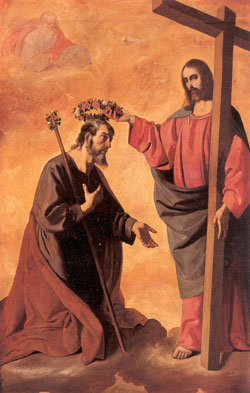
On 13 November 1962 Pope John XXIII, acceding to the wishes of more than four hundred Fathers of the Council, introduced the name of Joseph, spouse of the Virgin Mary, into the Canon of the Roman Mass. This decision provoked mockery from the progressivist clan. In order to please the Protestants, Father Congar wrote at that time in the I.C.I.:
« To pay a too exclusive attention to the human – and even childish – aspects of the life of Jesus, to develop with a pervasive predilection the aspects of the human history of Jesus, risks changing the equilibrium of the Faith (sic !) to the sole profit of those sweet, tender, and sentimental elements, to the detriment of a view of faith called for by the New Testament, and singularly by Saint Paul. Can one feed, at the same time, on Saint Paul and on the “ Month of Saint Joseph ” ? Is it not either one or the other ? » (1 December 1962)
As for the Abbé de Nantes, he has never varied in his tenderness and devotion for Saint Joseph, “ great protector ” of the Little Brothers and Sisters of the Sacred Heart; hisconfidence has not ceased to grow with the years and the favours received. With his marvellous understanding of the holy Scriptures and his profound knowledge of the human heart, our Father has understood the secret of this tremendous saint, and has expressed it with a rare felicity:
« Oh Saint Joseph, good and just man, our father and our protector, who would make himself the herald of your inner grandeurs ? I dare not. I suffer too much, however, at seeing them ignored not to try to recount them in my unworthy manner. So many souls would be marvellously helped by it ! He who would understand the beauty and the delicacy of the love you bore for the Virgin Mary, were he the greatest of sinners, would feel the irresistible attraction of your virtue. Permit me to open your heart in order to reveal the secrets jealously kept there… » (Pages mystiques, Vol. I, March 1970)
In his school, lets us enter into the sweet and humble heart of Saint Joseph by opening the Gospel, not in the Protestant fashion, but with the eyes and heart of the Catholic tradition.
We will see in a second part the providential role that he has played in our sacred history, particularly in times of crisis, and that he will play again tomorrow. The Church will then overflow with gratitude to Saint Joseph who will have saved Her from the greatest peril, giving him the place he deserves on earth, the same one he occupies in Heaven beside Jesus and Mary.
JOSEPH, PRINCE OF HIDDEN VIRTUE
Saint Matthew concludes his genealogy or « genesis of Jesus Christ, Son of David, Son of Abraham » by these simple words: « Jacob begot Joseph, the husband of Mary, of whom was born Jesus, who is called Christ. » (Mt. 1, 16)
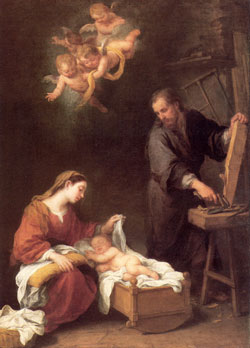
Everything is said here concerning the mystery of his descent, marking his unique vocation within the divine plan. Through Jacob, his father, Joseph inherited the whole of the Old Testament, from the Promises made to the patriarchs to their virtues: the faith of Abraham, the patience of Jacob, the purity of Joseph. « Son of David », he is of the royal lineage, bearer of the Messianic promises. The point at which his vocation takes shape, however, is his betrothal to the Virgin, « of whom was begotten Jesus. » God, who begets His Son from all eternity, begot Him in the womb of Mary, the virginal spouse of the just Joseph.
« HE WAS A JUST MAN. » (Mt. 1, 19)
Who told that to Saint Matthew, so that he might transcribe it with confidence in his Gospel, probably without having ever known Joseph ? Who could it have been except the Virgin Mary, for she alone could speak of him and of herself with such discretion and delicacy.
Joseph was just because of his faith, for « the just man lives by faith » (Ha. 2, 4.) Because he feared God with a sincere heart, his ways were straight. He observed the Law, since God commanded it, but not in the manner of the Pharisees, who claimed to be “ just ” solely because of their observance of the Law. Diligent in scrutinising the Holy Scriptures, Joseph knew from experience that this practice could not please God unless it was accompanied by faith, faith in the Messiah to come.
« It was to him, because they knew and esteemed him, that the parents of the Virgin Mary spoke », in order to confide their child to him and ask him to assume the duty of her protection that soon they themselves would no longer be able to fulfil.
THE GIFT OF THE IMMACULATE CONCEPTION
They were betrothed, therefore, which, according to Jewish matrimonial law, was the equivalent of a marriage contract – to such a point that the fiancée was called ‘spouse.’ She did not yet live under her husband’s roof but remained for another year with her parents. Our Father has described the union of their hearts:
« In what did a conjugal love that was apparently separation, silence, solitude, consist ? It consisted in a mutual ‘inhabitation,’ in the image of the Trinitarian mystery. He lived in Her and She in him, ceaselessly and without reticence. The presence of Mary was, as we would say, of an extraordinary density. Saint Joseph also, without realising it, had upon Her the same influence. “ How he loves God ! How he serves Him ! How honest, just, and good he is ! What admirable devotion ! What a saint ! ” The Virgin did not cease these secret litanies of admiration and affection, without any memory, any gesture, ever coming to change this image that she had of him in her heart. As for him, all the good that he thought, all that he desired, was in a perfect sharing of views with her; it was as if her heart were there beating within his. It seemed to him that she vivified everything in him, with her incomparable fervour. There were, secretly, other litanies that already sang his virtues. She sanctified him by Her very presence, and he seemed to bear within himself a love emanating from Her, which transported him and the memory of which he never felt the need to put aside in order to go to God. » (Letter to My Friends n° 98, 8 December 1961.)
In giving themselves to each other, it was God that they gave each other, for it was in faith that they were espoused. Such was the perfection of their contract, such was the mark of their mutual confidence. The heart of the just Joseph received from it as it were a revelation: in loving the Virgin Mary as the incarnation of the Law, of the divine Wisdom so ardently desired, he entered into a love of complacence that God the Father had for this blessed child, who is His perfect, his “ Immaculate Conception. ”
Such was the first mystical gift accorded to Joseph, of whom God wanted to make His image on earth. Like gold purified in the crucible, however, he had first to pass through a trial.
THE GREAT TRIAL OF SAINT JOSEPH.
The mystery of the Incarnation of the Word in the womb of his chaste fiancée took place in secret in the house where the Virgin lived, the same one on which today stands the basilica of the Annunciation. Part of it is a grotto (venerated in the crypt of the basilica) and another part is a brick house, the “ Santa Casa ” transported to Loreto as Brother Bruno has demonstrated (cf. From Nazareth to Loreto, the House of Mary, CCR n° 280, pp.1-20, or Bible, archéologie, histoire, t. 2, pp. 67-86)
Saint Joseph knew nothing of the Event, but when his fiancée returned from Her visit to Elizabeth at Ain-Karim he guessed, from certain unmistakeable signs, that She was expecting a child. « Not for an instant did he doubt the virtue of his fiancée. Since She came back, it was enough to say that the thing was holy. “ Not wanting to denounce Her publicly, ” writes Saint Matthew, “ he resolved to put her away privately. ” (1, 19) Great God, why that ? The Law did not apply to Her, since She was innocent.
« Only one light came to strike your mind », wrote our Father, « to which you would not dare consent except for the admirable gifts of fervour, of holy delight, of messianic joy that it poured into you. Yes, this thought was holy, its elation lived within you, filled you, and overflowed from your heart, rejoining the serenity of Mary and giving it the sweet certitude of your wordless communion in the same celestial secret. Radiant, you heard ringing out within you the Good News, the Gospel in which the ancient prophecies –even yesterday not understood – were illuminated: “ Behold the Virgin shall conceive and bear a Son, and His Name shall be Emmanuel. ” Your intuitive heart proclaimed the ‘almâh, the young, innocent, and immaculate virgin, before your ear heard it from God: it was She ! » (Page mystique no. 21.)
Despite this joy, however, Saint Joseph considered himself unworthy of such a gift.
An angel then came to calm his anguish by throwing a great light upon it, revealing to him in a dream what he did not dare to think: « Joseph, son of David, do not fear to take to yourself Mary, your spouse, for He who is conceived in Her is the work of the Holy Spirit. » (Mt. 1. 20)
THE PATERNAL HEART OF SAINT JOSEPH.
« Once this was revealed, Joseph did as the Angel of the Lord had prescribed: he took to himself his spouse. » (Mt. 1, 24)
The Angel had added, « She will bear a son, and you will call His name Jesus, for He will save His people from their sins. » (Mt. 1, 21.) The fact of giving the child his name was recognition of paternity. It was more than legal paternity, it was a paternity of the heart, mind, and will that Joseph received as his share: God made him the magnificent gift of a Father’s heart.
« In this mysterious fruit enclosed in the virginal womb of his own spouse, Joseph now recognised the fruit of his prayer and his pious desires. Never had a man participated in the paternity of God as had this one; never had a man wished to be a father and had in fact become one as had this man. He is at this moment the perfect model of fathers, those who give birth in the flesh for Christ and the Holy Spirit, not for corruption and death, and better still, those who give birth to Christ in souls, with an ardent spiritual paternity. » (Letter to My Friends no. 102, February 1962.)
Bossuet explains: « The fact is that the true father of Jesus Christ, that God who engenders Him in eternity, having chosen the divine Joseph to serve as the temporal father of His only Son, somehow caused to flow into his breast some ray or spark of that infinite love which He has for His Son. This is what changed his heart, this is what gave him the love of a father. » (Panegyric of Saint Joseph, 1659.)
HEAD OF THE HOLY FAMILY.
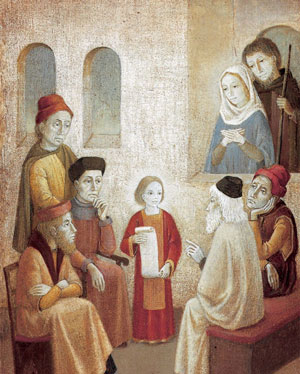
So there we see Joseph, made head and guardian of the Holy Family at Nazareth, and soon at Bethlehem where the child of the Promise was born, and at the Temple of Jerusalem for His Presentation. Obedient to the order of the Angel, he was obliged to flee along the roads of exile in order to escape the anger of the tyrant. He returned finally to Nazareth, as the Angel had told him. He had cares always, because of his poverty, and solicitude for the sacred trust that had been entrusted to him. Mary, doubtless, understood better the sovereignty that Her Son was already exercising over all things.
He is the Father, invested with the benevolent and beneficent authority of the Father of Heaven, and it is as such that Jesus and Mary loved and venerated him. The Son of God, who would later say that He did nothing without the permission of His Father, had the same relationship with Saint Joseph, calling him by the sweet name for father: “ abba. ”
« Your father and I have sought You sorrowing.
– Why did you seek Me ? Did you not know that I must be in My Father’s house ? »
Our Father sees in this episode of Jesus found in the Temple at the age of twelve the beginning of a revelation that the Child, coming out of His silence, made to His holy parents.
PARADISE REGAINED.
« He went down with them and came to Nazareth ; He was subject to them », notes Luke (2, 51.) Since this is the only thing that the Blessed Virgin revealed about their life at Nazareth, it must be important and Saint Joseph had a major role in this “ subjection. ”
The hidden life at Nazareth was « a life of prayer, obedience, and work » according to the old catechism. It was by this simple life that Joseph had to prepare Jesus for His mission of Redeemer: « For He will save His people from their sins. » This would be in imitation of the Joseph of Genesis, sold by his brothers, in reality sent by the good pleasure of God « to save them by a great deliverance » (Gn 45, 7.) As for Him, the carpenter of Nazareth of the merciful heart, he doubtless had much to pardon, thus anticipating the mystery of salvation by the Cross. « Virtue, truth, sanctity attract, but at the same time they are repulsed, scorned, persecuted…and this is what renders the destiny of the saints so hidden, so nurtured by abjection, so calumniated. Nazareth is not opposed to the drama of the public life and of the cross; it leads there. » (Letter to My Friends no. 82, February 1961.)
His mission ended, Saint Joseph stepped aside and disappeared into silence. The tradition of the Church has always held that he died in the arms of Jesus and Mary, thus becoming the patron of “ a good death ” after having been the patron of “ a good life. ”
II. THE TIME OF « GROWTH »
From the second to the twelfth century, from Saint Justin to Saint Bernard, Saint Joseph was the object of admiration of the Fathers of the Church, who all rendered homage to him, but he was not the object of a public cult. It was necessary for the sole, divine, paternity to be proclaimed first. Joseph, whose name means “ growth, ” bided his time.
It came with the Crusades and the influx into the West of relics from the Holy Land. The Carmelites and Franciscans soon became his devotees, but for Saint Joseph to be invoked in the great issues of the Church and of Christianity required the appearance of Jean Gerson, chancellor of the University of Paris (1363-1429.) This good and holy priest, defender of the royal religion some years before Saint Joan of Arc came to restore it « in the name of God » did not hesitate to act politically when the good of souls and that of the Kingdom so required. (CCR n° 258, May 1993, pp. 5-9)
WHEN THE KINGDOM INSPIRED PITY
In July 1413, Paris was bleeding and burning. The capital suffered the worst days of the civil war between Armagnacs and Burgundians.
How could peace be restored within hearts, and above all consolidated on solid foundations ? It was the moment Gerson chose to write a circular letter « to all the churches of the Kingdom, especially those dedicated to the memory of the most blessed and glorious ever virgin Mary » in order to propose to them the institution of a feast in honour of this holy marriage.
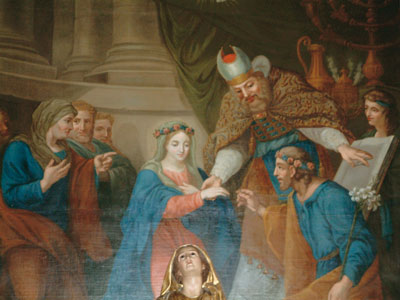
The union of hearts and minds at Nazareth, and the peace that was its result, was for him the ideal at which all should aim. To honour this marriage was to glorify Christ Jesus who, in return, would rebuild the unity of the Church and the kingdom. It was very simple !
A “ Council of Faith ” took place in Paris at the end of that year 1413. Our champion of the Faith and of devotion to Saint Joseph, not having been able to obtain the feast he so desired, resolved to go to the general council at Constance to plead his cause there.
FOR THE UNITY OF HOLY CHURCH
This Council was to put an end to the appalling schism that had been tearing Western Christianity apart for over half a century. There had been two popes, then three. Never had the Church felt so painfully the necessity of her unity, and never had she felt so powerless to realise that unity by human means. What was the remedy ? Passionately, Gerson preached « Recourse to Saint Joseph » before the assembly of the Fathers.
On 8 September 1416, he gave a sermon on the occasion of the Feast of the Nativity of the Virgin Mary.
He asked that the Church pronounce in favour of the Immaculate Conception of the Virgin Mary. Then he came to that which was so dear to his heart: « My great desire », he said, « is to see celebrated in the Church a new solemnity, either in honour of the marriage of Saint Joseph, or in memory of his blessed death, in order that, through the merits of Mary and the intercession of such a powerful patron who exercises a sort of empire over the heart of his Spouse, the Church might be returned to her only spouse, the legitimate pope, who takes the place of Christ for her. »
The pope, who must have authority in the Church, is thus the figure of Saint Joseph: let him be in a position to perform his duties, let him will to do so, and « all will go well. » In the Church as in the kingdom, Saint Joseph will restore peace by restoring order and unity in the Faith.
It was necessary to wait for Sixtus IV in order to have the feast of Saint Joseph entered in the Roman Breviary in 1481, for 19 March.
IN ITALY AND SPAIN
In the following century, zeal for devotion to Saint Joseph seemed to emigrate over the mountains. In Italy it was shown by the Dominican Isidore of Isolanis, one of the first theologians to rise up against Luther. In the same period he wrote a “ Summa of the Gifts of Saint Joseph ” (1522), in which he insisted on the importance of the cult of Saint Joseph for the preservation of the Faith, peace in the world, and the missionary expansion of the Church, especially in the last times.
In Spain, Saint Teresa of Avila placed her first reformed convent under the patronage of « Monsignor Saint Joseph » in 1561. Eleven others would be similarly dedicated, and the Madre would spread everywhere the cult of him whom she called « my true Father and Lord. »
« I took the glorious Saint Joseph for advocate and patron », she wrote, « and recommended myself insistently to him… This glorious saint, as I know from experience, assists us in all our needs. Our Lord wishes to make us understand that, if He was subject on earth to him whom He called His father, because he was His director who could command Him, in Heaven He also defers to all his entreaties…I have never seen anyone who was truly devoted to him who did also advance in virtue, because he singularly favours the spiritual progress of those who confide in him. »
The Blessed Virgin herself appeared to her on the feast of the Assumption in 1561, in the company of Her spouse:
« She told me that I gave Her great joy by serving the glorious Saint Joseph. »
THE GREAT CENTURY OF SAINT JOSEPH
Let us come now to the seventeenth century, that the Marquis de La Franquerie called the « great century of Saint Joseph in France. » The triumphant Counter-Reformation made him its favourite saint. Not one religious institute was founded without his protection: the Sisters of Charity, the Christian Brothers, the Eudists, the seminary of Saint Sulpice, that of the foreign missions, etc. Madame Acarie, Blessed Marie of the Incarnation, founded the Carmel of Saint Joseph of Pontoise, which would have a special cult of the heart of Saint Joseph. The church of Saint Joseph des Carmes was the first in the kingdom to be consecrated to him, in 1620.
We must not forget New France, which Saint Joseph seemed to make his chosen country. Let us now come to the apparition of Cotignac, which was to prompt the King to consecrate his kingdom to Saint Joseph.
It was Our Lady who appeared there first, on 10 August 1519, to ask for a chapel in honour of Our Lady of Grace so that people could come there in procession. She spread Her favours throughout the region, and not the least of them was preserving it from invasion by the lansquenets of Charles V, then by the rebellious Huguenots, with the armed assistance of Jean of Ponteves, Lord of Cotignac, one of the most valiant captains of his century.
The Blessed Virgin seemed to be attached to this little Provencal sanctuary since, a century later, she asked the humble Brother Fiacre, from the convent of the discalced Augustinians in Paris, to make a novena in Her honour, as well as two others to Our Lady of Victory and Our Lady of Paris, in order to obtain the birth of a dauphin. To this sacred history are intimately linked the consecration of France to the Blessed Virgin and the birth of Louis XIV, Louis the God-given [or, ‘Gift of God’], in 1638. Louis went on a pilgrimage of thanksgiving to Cotignac with his mother, Anne of Austria, the 21st of February, 1660.
THE APPARITION OF 7 JUNE 1660
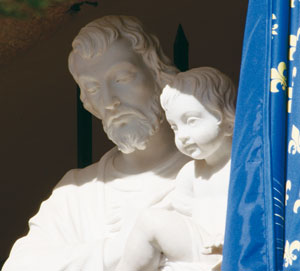
The following 7th of June, by a provision of the Treaty of the Pyrenees, which finally established peace between France and Spain, the young king welcomed into his kingdom the Infant Marie-Thérèse, daughter of Philip IV. The same day, Saint Joseph appeared at Cotignac in a very simple, very evangelical manner.
A young shepherd named Gaspard Ricard was pasturing his flock on the dry upper slopes of the Bessillon. It was midday and the heat was scorching. Suddenly, there appeared at his side a man of imposing stature who, with a benevolent gesture, pointed out to him an enormous rock, and said to him:
« Iéu siéu Joùsé; enlevo-lou e béuras. I am Joseph; move it and you will drink. »
Gaspard hesitated, but Saint Joseph repeated his order. The shepherd obeyed, moved the rock with the greatest ease, and discovered fresh water that began to stream out. He drank eagerly, and when he got up again, the mysterious person had disappeared. Leaving his flock there, Gaspard ran to the village to bring the news. People came in haste, in order to see that in that place, which everyone knew had no spring, abundant water was now flowing. The consuls of Cotignac decided without delay to build a chapel, which the bishop of Fréjus, Zongo Joseph Ondelei, deputy from Provence to the Assembly of Clergy being held in Paris, gave into the care of the Oratorian chaplains of Our Lady of Grace. He did this « in order not to separate, in the devotions of the faithful, the two holy persons that God had joined on earth for the mystery of our salvation. »
The facts, attested before the Assembly of the Clergy, came to the ears of the King, who knew what he owed to Our Lady of Grace. Struck by the coincidence of the events of 7 June – the arrival of his fiancée and the apparition of Saint Joseph – he could do none other than yield to the appeals of his mother and his future wife and consecrate his kingdom to Saint Joseph.
Then, on 8 March 1661, Mazarin died. On 10 March, the young King declared before his council that if, up to the present he had been pleased to allow his affairs to be governed by the late Monsieur Cardinal, « it is time that I govern them myself. You will assist me, gentlemen, with your advice when I ask for it. » From that day on, he intended to be King, lone and sovereign depository of divine authority in his kingdom and accordingly to govern. Well, on 12 March one of his first governmental acts was to have registered the act that declared Saint Joseph patron of France, and stipulated that from then on his feast would be a holiday throughout the whole kingdom.
SAINT JOSEPH PATRON OF THE UNIVERSAL CHURCH
We now arrive at the nineteenth century, the “ Great Century ” of Saint Joseph for the Church. The number of religious communities, confraternities, dioceses, universities, and even nations placed under the patronage of Saint Joseph had not ceased to grow: Mexico (1555,) Canada (1624,) Peru and Bohemia (1655,) Flanders (1679,) etc. After his accession to the papacy, Pope Pius IX decided to extend to the whole church the feast of the patronage of Saint Joseph (1847.) He chose for this the third Sunday after Easter, in order to place the Head of the Holy Family within the light of the Resurrection. His watchword was: « Go to Joseph, and do whatever he tells you. » (Gn. 41, 55)
The years that followed were marked by the proclamation of the privilege of the Immaculate Conception of the Virgin Mary (1854) and the condemnation of the modern spirit of impiety and of liberalism (Syllabus, 1864.) These two things were really one, and those years saw the forces of Hell unleashed against the papacy, as well as numerous requests that the Pope proclaim Saint Joseph Patron of the Universal Church. A petition for it circulated among the Fathers of Vatican Council I.
Unfortunately, the Council had to interrupt its sessions in July 1870, before this request was granted. The following 8 December, however, by the decree Quemadmodum Deus, Pius IX proclaimed Saint Joseph Patron of the Universal Church.
« Always », he wrote, « in critical hours, the Church has implored his assistance. In the very sad times that we are going through, however, when the Church Herself, pursued by her enemies from all sides, is weighed down by such great calamities that the impious are already persuaded that the time has come at last when the gates of Hell will prevail against Her. Profoundly moved by the lamentable state of things at present, and desiring to place himself and all the faithful under the very powerful patronage of the holy patriarch Joseph, the Pope has deigned to accede to the wishes of so many venerable pontiffs. This is why he solemnly declares Saint Joseph Patron of the Catholic Church. »
He did not exaggerate the perils: the very day of the proclamation, the faithful of Rome who had assisted at the offices were insulted and mistreated at the exits of the churches. That evening, under the windows of the Vatican, the madmen cried: « Death to the Pope ! » Many people were proclaiming that with the fall of the Papal States, the papacy would be finished. The new king of Italy had the insolence to offer Pius IX, a prisoner in his own palace, his police and his troops to protect him, while several nations invited him to come and settle in them. Firm as a rock, Pius IX refused all these advances in order to place himself under the protection of Saint Joseph !
The fruits of this patronage were innumerable. We content ourselves here with gleaning from them a few significant or figurative examples. We will show in conclusion how our Father is for us today the link with this shower of favours.
THE HEALING OF SAINT THÉRÈSE
Let us travel to Alençon, to the home of the Martins. Zelie has just brought into the world her last child, little Thérèse, on 2 January 1873. Beginning in the month of March, however, the health of the infant gave rise to the most serious concerns.
« I went quickly up to my room », Zelie told her sister-in-law, « I knelt down at the feet of Saint Joseph and I asked him for the grace of the little one’s cure, while resigning myself to the will of God, if He wished to take her with Him. I do not cry often, but my tears flowed, while I was making this prayer.
« I did not know if I should go down…Finally I decided. And what did I see ? The child was nursing with all her strength. She did not let go until close to one in the afternoon; she threw up a few gulps, and fell onto her nurse as if she were dead.
« There were five of us around her. All were struck by it; there was a servant who was crying, and I felt my blood run cold. The little one apparently had no breath. We leaned close to try and discover a breath of life, and could not catch it – but she was so calm, so peaceful, that I was thanking God for having made her die so peacefully.
« Finally, a quarter of an hour later, my little Thérèse opened her eyes and began to smile. From that moment, she was completely cured… » (Family Correspondance, p. 150.)
She in whom our Father loves to see the figure of the Church at war with the demon in our times of apostasy, had only to raise her eyes to her father, her « dear king », in order to think of Saint Joseph: « If an earthly father is so ideal, so perfect, what must the good God be ! » she used to say.
SAINT PIUS X
When Pius IX placed the Church under the patronage of Saint Joseph in 1871, Joseph Sarto was a priest of Salzano. He was a man of prayer, giving himself without counting the cost in his ministry, and poor, mortified, and good besides. « The more I reflect on it », wrote our Father, « the more I think that no man in the world resembled Saint Joseph so much …
« His parishioners surnamed him Don Giuseppe Santo, which says everything. He straightway organised his ministry in such an orderly fashion that one can guess at the long premeditation. The parish priest of Salzano would become the model for all the parish priests of the world, for all time. His children’s catechism was set out in dialogue form, according to Don Giuseppe’s own method. He had children receive Holy Communion at a very early age and exhorted good Christians to frequent Communion. He renovated divine worship: neither innovating nor destroying, he restored. He instituted the Confraternity of the Sacred Heart at Salzano. For the poor peasants, he founded a rural bank and courageously pursued the apostolate of social justice – yes indeed ! At the time of the cholera epidemic in 1873, he practised heroic charity to the point of exhaustion: « He was everybody’s servant and look at the result: skin and bones ! » He even performed wonders, true miracles, to help the poor. A fire would be extinguished at his word of command and insects devouring the vine would vanish as a result of his prayer… » (CCR no. 69, December 1975 pp. 9-10.)
As Pope, he promoted the propagation of devotion to Saint Joseph with all his power. We owe to him the institution of the “ Litanies of Saint Joseph ” (1908,) as well as the octave of his feast day.
SAINT BROTHER ANDRÉ.
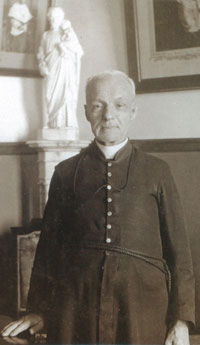
During the same period, a humble lay brother of the College of Notre-Dame of Montreal was pointing out the exceptional power granted to Saint Joseph. « Go to Saint Joseph » he would say tirelessly, « because he is all-powerful. »
Behind his very simple faith was hidden an extraordinary intimacy with Saint Joseph that he received through his mother from Msgr. Bourget, the valiant and effective defender of the integral Catholic Faith in Canada. In 1904 there was built a small oratory on the mountain overlooking the city of Montreal. In 1909, Brother André became the guardian of it and received from Rome a statue of Saint Joseph blessed by Pope Pius X. The good brother recommended prayer to Saint Joseph, the wearing of his medal, or rubbing oneself with the oil of the lamp that burned in front of his statue…and the miracles abounded, before witnesses !
Why all these miracles ? Our Brother Pierre has demonstrated it very well: it was to preserve the Catholic Faith in Canada at a particularly perilous moment (see the bulletin of the Renaissance catholique au Canada no. 122, November 2004.) French-Canadian workers were threatened with coming under the power of the Anglo-Protestant syndicates in thrall to American finance. The growing impiety met with a breakwater of invincible resistance: the Oratory of Saint Joseph, where the construction of the basilica began at the worst moment of the crisis of 1929. It was the good Saint Joseph who, through the humble ministry of Brother André, took a pitying interest in the miseries of his people in order to keep up in them the Catholic Faith, the virtues, and their popular religion, at the furthest remove from the revolutionary spirit. The miracles, said Brother André, « are to open the eyes of the world and to convert it, but one could say that it does not see very clearly. »
THE APPARITION OF 13 OCTOBER 1917
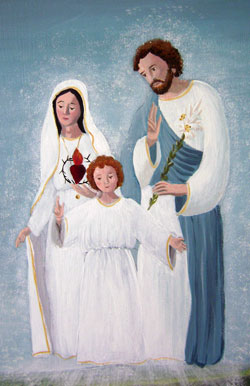
Our Lady had said on 19 August 1917, at Valinhos, that Saint Joseph and the Infant Jesus would come « to give peace to the world » the peace confided to her Immaculate Heart. The Head of the Holy Family is thus her indispensable ambassador and the distributor of her graces.
The 13 October, at the Cova da Iria, « After Our Lady had disappeared in the immensity of the firmament », Sister Lucy related, « we saw, next to the sun, Saint Joseph with the Child Jesus and Our Lady robed in white with a blue mantle. Saint Joseph and the Child Jesus appeared to bless the world, tracing the sign of the cross with their hands. »
« This presence of Saint Joseph » our Father explains, « is not only a reminder of the devotion that one ought to have for him, but also a sign that Heaven is giving us of the power of this saint, for the times that the Church is going to live through. »
It was, under the apocalyptic sign of the fall of the sun, a call to conversion, war being the wages of impiety, as well as to the sanctification of families as Sister Lucy explains in “ Calls from the Message of Fatima ” (no. 16.) How can one not admire in this apparition of the Holy Family the charming conciliation, resemblance, and imitation of Saint Joseph and of the Infant Jesus in his arms, each with the heart of a child as our Father loves to contemplate them, precious treasures of the Virgin Mary and of the Church ! They bless us as a parish priest would do.
It is still necessary to understand well the lesson that Saint Joseph is trying to breathe into our souls, and into the whole Church.
THE ESSENTIAL LESSON OF SAINT JOSEPH
Saint Joseph is a “ Just Man, ” who has his eyes fixed on God, His law, His sovereign will. His heart is the mirror of divine truth. As Father and Patron of the Church, he wants it to adhere to him with a docile and loyal heart. He assists it with all his power, but it is necessary for the authorities within the Church to do their duty, teaching the truth and condemning error. The appalling decadence of our lives is only the rotten fruit of our apostasy. Saint Joseph cannot save us from that apostasy unless we renounce the causes that have provoked it. The Faith comes first ! That is what gives our Counter-Reformation its unshakeable foundation.
The Faith is the nursemaid of all the virtues; it brings with it the respect for discipline, authority, and the order that it legitimates. In the same way that the Son and the Holy Spirit in Heaven obey God the Father in all things because it is from Him that their life proceeds and They are completely turned toward Him, in the same manner our Heavenly Father has willed that all earthly society should be paternal. There can be no progress, order, or justice except to the degree that the family obeys the father, or the entire factory obeys the owner, or the whole nation obeys the prince.
Saint Joseph thus wills to restore Christianity, contrary to all cult of man, in disgust for the idolatry of self, of capitalo-socialism, of anarchy. He, the least of the three glorious members of the Holy Family, was the Father and protector of Jesus and Mary; he was in charge, having the grace of state for it. He reigns eternally in Heaven. « Behold that in his school, we relearn how to love our fathers, our bosses, our princes, our pontiffs, our popes, our heads of families, professions, nations, the Church. We admire the fact that in Canada Saint Joseph is so honoured at Mont Royal, in sweet and humble anticipation of the Sovereign Pontiffs and the Christian Kings… » (CRC no. 233, June 1987, p. 25)
The Holy Family is the model for the Church, and the Church is the model for temporal society. « If you will the salvation of the world » wrote our Father in the aftermath of the Council, « recreate holy families and other Nazareths ! » (Letters to My Friends, no. 221.) In the terrible crisis that menaces the world, we must remember this; hence the invocation that he initiated in 1987 for the use of our communities and our families:
reign over us, govern us, save us !
« It seems to me » he announced one day, « that there is going to rise up, some place in the world, a shepherd or some other ignorant person who will make known to the world that as long as it does not invoke Saint Joseph, it will not be saved, and that Jesus cannot resist the requests of the Blessed Virgin, and that the Blessed Virgin can only obey Saint Joseph because he is the boss. »
Brother Thomas de Notre-Dame du perpétuel secours.
He is risen ! n° 78, march 2009